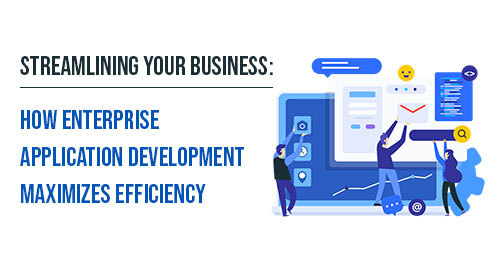Enterprise application development refers to designing, developing, testing, and deploying software applications that support organizations' core functions, including large-scale operations, complex workflows, and data-driven decision-making. Enterprise app development requires a substantial investment of time and money. So ensuring your efforts result in a high return on investment is crucial.
By adopting a collaborative approach to enterprise application development, businesses can ensure that the application is tailored to their specific needs, leading to increased adoption, higher user satisfaction, and more efficient use of resources. Ultimately, prioritizing efficiency in enterprise application development is essential for businesses looking to stay competitive and adapt to the rapidly changing digital landscape.
This article will explore essential factors to maximize efficiency during enterprise application development.
What is Enterprise Application Development?
Enterprise app development is creating a big solution that can handle the needs of organizations. This solution helps the organization solve its problems and communicate better with customers, employees, and partners. With enterprise application services, work gets done faster and more automatically. Therefore, ensuring that a fast, flexible, and scalable application supports the company's growth is crucial.

Enterprise software solutions are designed to meet the specific needs of large organizations, including businesses, government agencies, and non-profits. These solutions are typically complex, scalable, and feature-rich and developed using advanced technologies and methodologies to ensure high performance, reliability, and security.
Enterprise software development involves using technologies, methodologies, and programming languages to develop high-quality, scalable, and robust software applications that handle large volumes of data and complex workflows.
Enterprise software solutions require a significant investment of time and resources to implement and maintain but can result in substantial benefits for the organization in terms of increased efficiency, productivity, and profitability. Enterprise software development is critical for organizations that require custom software solutions to support their unique business needs and improve operational efficiency.
Enterprise Application Examples
Organizations implement various types of processes based on their specific needs and employ a range of applications to enhance and streamline these processes. To optimize their operations and improve customer interaction points, enterprises rely on the features of different types of enterprise software solutions.

Source: Statista
The global expenditure on enterprise software is anticipated to be around 783 billion U.S. dollars in 2022. As a result, various enterprise software sub-categories, such as business process management (BPM) software, CRM software, and enterprise resource planning (ERP) software, have become essential markets in their domains.
Organizations use various enterprise application services to manage and automate their business processes. Here are some enterprise application examples:
Business Intelligence (BI) Apps
BI apps are software applications that help organizations analyze and understand their business data to make informed decisions. Business Intelligence apps offer a range of features, such as dashboards, reports, charts, and graphs, that provide insights into key business metrics such as sales, revenue, inventory, and customer behavior. These insights can help organizations identify trends, opportunities, and potential issues and make data-driven decisions to improve their operations and profitability.
Customer Relationship Management (CRM) Apps
CRM apps are software applications that help organizations manage their interactions with customers. These apps allow businesses to keep track of customer information, such as contact details, purchase history, and communication preferences. With a CRM app, companies can gain insights into customer behavior, preferences, and needs, which can help them provide better customer service and support. CRM apps can help businesses improve customer relationships and increase customer loyalty by delivering personalized and relevant interactions.
HR Management Apps
HR management apps are designed to help organizations manage their human resources more effectively. These apps automate HR processes, such as recruitment and onboarding, performance management, and training and development. As a result, HR management apps can improve the efficiency of HR operations, reduce paperwork, and streamline communication between HR teams and employees. Also, they can help organizations to manage their workforce more effectively, improve employee satisfaction, and reduce costs associated with HR operations.
Accounting and Financial Management Apps
Accounting and financial management apps are designed to help businesses manage their financial data, including expenses, revenue, invoices, and taxes. By providing automation features such as transaction categorization, invoice generation, and bank account syncing, these apps help businesses save time and minimize the possibility of errors. In addition, you can integrate these apps with other enterprise applications, such as ERP systems, for larger organizations to provide a complete financial management solution.
Collaboration Apps
Collaboration apps are becoming increasingly important as more teams and businesses move towards remote and hybrid work models. These apps are designed to make communication and collaboration more accessible and efficient, regardless of team member's locations. In addition, by providing a centralized platform for file sharing, messaging, and task management, these apps can help teams work more efficiently and effectively.
Supply Chain Management Apps
Supply chain management (SCM) apps help businesses optimize their supply chain operations. It manages the flow of products and services from the origin to the endpoint. SCM involves planning, executing, and controlling the movement and storage of goods and services and managing the associated information flows. These supply chain management apps can assist businesses in optimizing their processes, lowering costs, and increasing efficiency.
Analytics Apps
Analytics apps analyze data from various sources, including web analytics, sales data, customer data, and social media data. In addition, they use data visualization tools, such as charts, graphs, and dashboards, to help users identify insights in their data. One of the key benefits of analytics apps is that they enable users to make data-driven decisions. By analyzing data in real-time, users can identify trends to optimize their business processes, improve customer satisfaction, and increase revenue.
Benefits of Enterprise Application Development
Enterprise applications have become a trusted solution for businesses worldwide, streamlining and unifying their core operations. In addition, by leveraging enterprise application services, companies gain access to numerous benefits that enable them to compete globally. Here are some essential benefits highlighting the importance of developing enterprise software solutions:
Boost Productivity
Enterprise application development offers significant benefits, including enhancing business productivity. With the help of enterprise software development, you can streamline operations, and employees can access data rapidly and efficiently. In addition, you can automate processes such as scheduling and customer support through advanced technologies.
- Simplify workflows and streamline processes to enhance productivity.
- Automate repetitive work to save time and minimize errors.
- Employ advanced technologies to optimize operations.
- Gain better control over data by leveraging tools to manage and analyze it effectively.
Enhance Customer Service
Enterprise app development offers the advantage of improving customer service by enabling quick and easy access to information. It reduces the time spent on customer queries, translating into a more efficient and effective service experience. In addition, businesses can benefit in the following ways:
- Maximize operational efficiency by simplifying and automating tasks.
- Reduce operating costs by optimizing resource allocation and minimizing waste.
- Enhance the customer experience, resulting in increased sales and customer loyalty.
- Leverage data-driven decisions to achieve more accurate targeting and better outcomes.
Improve Engagement
Enterprise application services increase customer engagement and interaction with businesses. These apps provide an interactive platform for customers to share feedback and opinions, fostering stronger connections between companies and customers.
Moreover, enterprise application development can facilitate better communication, making it easier for teams to collaborate, share information, and work together effectively. By streamlining workflows and automating customer service operations, businesses can deliver more efficient customer service, enhancing engagement and satisfaction.
Create New Opportunities
Enterprise app development presents exciting opportunities for businesses to innovate and expand their offerings. For example, with an app, companies can create new ways for customers to engage with their brand, such as:
- Customers can purchase directly from their phones, providing a seamless and convenient experience.
- Allowing access to new features that enhance the customer experience, such as personalized recommendations or exclusive content.
- Providing exclusive content through an enterprise app offers a unique experience that customers cannot find elsewhere.
These new opportunities can lead to increased customer satisfaction and loyalty, ultimately driving growth and success for the business.
Optimize Your Spending
Developing enterprise application services can provide cost-saving benefits for businesses. By automating processes, companies can reduce manual labor costs, minimize errors, and enhance efficiency. In addition, by providing a convenient platform for customers to interact with the business, an app can help build brand awareness, generate leads, and increase sales, reducing the need for costly advertising efforts. Overall, enterprise application development can offer businesses an effective means to achieve cost savings and drive growth.
Increases Operational Efficiency and Customer Data Security
Businesses can use enterprise application services to automate manual tasks and rapidly access essential information. It can also work with other team members in real-time. As a result, it improves communication and project administration, resulting in higher overall productivity. Furthermore, enterprise software solutions include enhanced security features not found in consumer applications. For example, authentication standards, user authentication methods, data encryption, two-factor authentication, secure storage, and other features are included. In addition, it indicates the security and privacy of all data stored on the app.
Must-Have Features of Enterprise Application Development
Enterprise application services are designed to meet the unique requirements of enterprise-level businesses and must have a range of features to ensure they are effective.
Here are some must-have features of enterprise application development:
- Scalability: Enterprise application services must be scalable to accommodate the growth of a business. The system should handle growing users, transactions, and data volume without performance issues.
- Integration: Enterprise app development must integrate with other systems and applications, such as ERP, CRM, and SCM systems.
- Security: Enterprise applications must have robust security features to protect sensitive information from unauthorized access, hacking, and other cyber threats.
- Customization: Enterprise software solutions should be customizable to meet an organization's specific needs. It involves adding new features, modifying existing ones, or changing the user interface.
- User-friendly interface: Enterprise application development should have an easy-to-use and navigate user interface. It can reduce the learning curve for employees and improve productivity.
- Mobile compatibility: Enterprise app development should be compatible with mobile devices to enable employees to access the system from anywhere at any time.
- Reliability and availability: Enterprise applications must be reliable and available 24/7 to ensure continuous operation and minimize downtime.
- Collaboration and communication: Enterprise software solutions should facilitate collaboration and communication between employees, departments, and teams. It can improve productivity, reduce errors, and foster a culture of teamwork.
Conclusion
Enterprise application development is essential for businesses looking to maximize efficiency and stay competitive in today's fast-paced marketplace. The Enterprise app development process simplifies workflow and automates routine tasks by leveraging the latest technologies and best practices. In addition, enterprise application services provide real-time data insights to make more informed decisions and achieve business goals.
Innoraft helps businesses keep up with changes in the market and technology by creating excellent enterprise applications. With our enterprise software development services, companies can maximize efficiency, improve collaboration, and achieve their desired outcomes.

